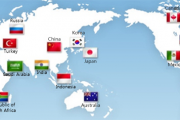Online community Ilbe has a webpage that collects informative ‘daily best’ posts. Recently, a thread discussing French economist Thomas Piketty‘s theories on wealth inequality in his sensational book “Capital in the Twenty-First Century” received a large number of comments.
From Ilbe:
Let’s take a look at the “Piketty-mania” that has shaken the international economics academia
1. Who is Piketty?
He was born in Paris, France in 1971 (43 years old). He received his PhD at the London School of Economics (LSE) when he was 22 years old. He taught for two years as an assistant professor in the Department of Economics at MIT. In 1995, he became a researcher at the French National Center for Scientific Research (CNRS). He is currently the director the the School for Advanced Studies in the Social Sciences (EHESS) and a professor at the Paris School of Economics.
In an interview, Piketty said he is not Marxist. He said, “I’m not from the generation that could be enticed by communism. I could look at capitalism and the problem of inequality from a new point of view.” Although he’s not Marxist, it is certain that he is Keynesian leftist. He was once an economic advisor for the Socialist Party in France. Let’s also keep in mind that he was one of the figures who supported a policy imposing fucking enormous taxes on the rich in France not too long ago.
2. Understanding the Piketty craze.
Debates surrounding the word ‘inequality’ are getting fierce around the world these days. While the mainstream school of the current economics is certainly neoliberal, it is undeniable that since the financial crisis of 2008, Keynesian leftist academics such as Paul Krugman are getting more attention.
Especially young people who recently began economic activities in society are experiencing inequality first-hand. They feel insecure and rapidly turn to the left. Rapid proliferation of leftists is a global phenomenon and it seems even among Ilbe users, there are more and more people who are doing the same thing.
While the time bomb was ticking, an economist named Piketty published a book based on his 15 years of research. That is “Capital in the Twenty-First Century”. It will be published in Korea around this Fall. The book will finally cause the bomb to explode.
Numerous leftist academics, journalists and people who were complaining about inequality are enthusiastic about this book. It was written in a way that people who didn’t study economics can understand easily without use of complex math equations. It has become such a hot issue that they say that at this rate the book will be the top bestseller in Harvard University Press’s 101 years of history.
In this heated atmosphere, market-friendly media and neoliberal academics are actively trying to refute the book. Because of this, Piketty and his book are getting even more attention.
3. Summary of Piketty’s “Capital in the Twenty-First Century”
• What does Piketty say?
– He gives 15-years worth of analysis of historical and economic data from a span of three centuries starting with the 18th century.
– He realizes that our world is heading towards a neo-Victorian classist society. (Hereditary capitalism.)
– The world is governed by hereditary wealth that wasn’t created by production.
– The richest 1% form their own cliques in collusion with politicians.
– When the rate of return on capital exceeds the rate of economic growth, the inequality becomes unsustainable.
– Then, democracy based on rewards for talents is undermined.
• Then what are the solutions?
– Impose ‘global wealth taxes’. (Maximum wealth tax at 2%, income tax at 80%)
– Impose progressive taxes on the high-income bracket’s property.
– Inequality is controllable through these measures.
– The goal is to put all transfer of wealth under public supervision.
– Especially the US and Europe should work together to incapacitate uncooperative tax havens.
• Is he some socialist? A commie?
– He does not oppose the principle of capitalism in which some degree of inequality leads to healthy competition.
– He claims that we can find a way to turn capitalism into something more peaceful and sustainable beyond cursory democracy.
• Have you not read a book like Gregory Mankiw’s “Defending the One Percent”?
– The democratic society we live in is based on the belief that inequality in wealth distribution depends on individual effort and talent rather than blood ties or property ownership.
– Then social inequality can be justified and accepted as long as members of society can collectively benefit from it.
– The current economics academia couldn’t get over childish obsession with mathematics and pure theories.
4. Media critics and academics who refuted Piketty’s claims
[…]
[Read more at the Piketty Chronicles.]
5. Media critics and academics who advocated Piketty’s claims
[…]
[Read more at the Piketty Chronicles.]
6. Epilogue & References
The Piketty craze is still ongoing. From this fall when his translated book will be published in Korea, it seems debates about his theories will fully take off in Korea. The impact will be outstanding because the issue of income inequality that has been brushed off as politically motivated discourse will be understood as a legitimate issue. We need constructive debates. I’m worried how Korean leftists and media will distort the Piketty phenomenon and create another propaganda campaign as they normally do. Hence, you should at least be roughly aware of the different sides of the story and I hope you don’t go to the extreme.
[…]
Comments from Ilbe:
Angels:
Ke ke ke, Prof. Han Dong-geun at Yeungnam University is a typical leftist professor. Look. He made a wrong point about the increasing wealth gap between the poor and the rich. Generally, you should look at the size of the middle class to measure the wealth disparity. But he suddenly delves into the elderly’s personal property matters. People older than 60 find it hard to work full-time and it should be regarded as a population aging problem. So is the middle class in Korea getting bigger? No, it has been decreasing recently. Let’s take a look at the history of the middle class in Korea. During the Park Chung-hee regime, wealth disparity was the largest. The prices went up rapidly while wages remained low. When Chun Doo-hwan seized power and let Kim Jae-ik manage everything about economy, the wealth gap quickly decreased and the middle class grew much bigger. Then why is the middle class shrinking now? In fact, Korea went through the golden era during Chun. As our economy quickly developed, we needed various regulations and our society turned more bureaucratic. Now it is hard to establish new companies and the management positions at big conglomerates are inherited by the CEO’s family members.
I have a typical rightist view on economics. I believe if our government reduces various subsidies and regulations, it would be easier for companies to run their businesses, and they will hire more employees. I think the high prices in our country are due to high import tariffs and protectionism. If you look at expensive snacks in the market, big domestic snack companies have kept their own territory without much competition. The government should reduce import tariffs and let foreign companies fairly compete with domestic companies. This will lower the prices of products and benefit common people. If the prices are low, people have more disposable income and can invest. This creates a desirable economic circle. Currently, Korean conglomerates keep increasing their investment overseas. Last time, the Korean government even said, “We will reprimand companies when their investment fails.” What crazy company would increase their investment in Korea when there are other countries that are kow-towing to host them? If you want to set up a factory in Korea, you need to prepare thousands of pages of documents. You should submit project plans, environmental assessments, each administrative office’s permission and deal with nearby residents’ complaints. I’m in the process of setting up a factory in a provincial region so I feel the hardship. If I had enough money, I would’ve moved to a foreign country to set up the factory.
I can talk about the case of Hyundai Motors. When a new model is completed, they ask their factories all around the world about how many cars they can produce everyday and at what price. The factories in Korea are so behind. For example, while a factory in America produces 10 cars, a Korean factory can only make 2 or 3 cars. In the US, wages increase according to productivity. But in Korea, militant labor unions suck the blood out of their company. It is painful for Hyundai to manage their factories in Korea whereas they have completed an efficient production system in the US. The Korean government is certainly doing something wrong. I hope we get out of welfare populism soon.
루드비히하이에크:
Does Piketty deserve to be called a scholar when he manipulated his statistical data on purpose? Look at what happened to France after following his suggestions. Rich people left France and in a couple of years, the far right-wing party managed to receive the top approval ratings.
고노무새끼!:
The solution part is so retarded that most academics don’t even bother debating over it. What drew real attention is the part that describes what happens when r > g, that is when the rate of return on capital (r) is higher than the rate of economic growth (g). About how wealth is concentrated. The idea of imposing wealth taxes is treated like a joke though.
아모르겠다:
I fucking agree with his depiction of the reality. Wealth is inherited and there are unofficial social classes. But there doesn’t seem to be any solution to this. Communism tried to solve it but failed. The problem is that there is no solution after all, ke ke ke. Humanity should just embrace such inequality. It’s good enough to not skip a meal and have fun. Who cares. Enjoy your life and just die when the time comes.
와카츠키유미:
Lefty commies whine and demand helping hands for commoners while they switch their mobile phones every six months, carry a MacBook and drive a car. Common people in Korea should have no problem making a living and enjoying some hobbies. They just waste too much money on education. When they become poor and in debt, they ask the government to take care of them.
바람의남자:
What’s fucking retarded is to think that making money only means doing labor or developing superior technologies. What about making money through real estate, stocks, prostitution, private loans, gambling….? Do these have anything to do with labor or technological development? Fuck that. Traditional liberal capitalists tried to instill the idea that the rich are rich because they are hard-working and talented. That doesn’t work in the 21st century. It is fucking funny to ignore the realistic differences between someone who couldn’t even go to university because they had no money and someone who at least went to a no-name university and managed to open their own chicken joint. If you are fucking talented, you can still better yourself even if you are fucking poor. But money prevails at the end of the day. People can directly feel it. Do you know that direct taxes are higher than indirect taxes in Korea? It just shows that you are a rightist zombie if you ignorantly believe the CEOs should only care about making the highest possible profits and welfare is pointless bullshit. If there are not enough buyers, how would sellers make money? If there is no buyer and laborer, capital means nothing. The rich give away some of their wealth because they know that is the way to protect themselves.
대중노무새끼: [In response to above]
Ke ke ke, you are talking as if the rich are exploiting the working class, ke ke ke. They created labor unions to prevent that. What’s the problem??? Isn’t the problem those fucking idiots who demand their boss to resign, oppose privatization and interfere with management, behind the shield of their union?? Aren’t the unions for permanent employees indifferent to when temporary employees go on protest? It is not the CEO but the permanent employees who exploit temporary employees, ke ke ke. Do you think their demand for their children’s privileged employment is fair? The unions for permanent employees don’t help out temporary employees because they are worried that employment privileges for their children will be undermined. Does the CEO have any say in this? The capitalists just watch their employees fight each other as if they are watching fires across a river. The working class people divide themselves and create their own classes. You don’t even have to blame the rich, ke ke.
천추:
Even the exploited class in developed countries belongs to the exploiting class from a global point of view. If you impose taxes according to Piketty’s claims, capitalists would lose their motivation to make more money. If you want true equal distribution of wealth, wealth should be transferred from developed countries to developing countries. Then, do you think life of the middle class and below in developed countries will be better than now…
붉은댓글:
Why are there so many who can’t read? Simply speaking, if someone makes profits using a billion won, a salaried person can never catch up with their wealth. Piketty proved this plain common sense using data from three centuries. To fix this, the suggestion is to increase the maximum income tax rate to 80%. Do you know this? Once upon a time in America, their maximum income tax rate was 90%. If you don’t know history, don’t even ramble about commies. And Jeong Gyu-jae? That guy only shows the claims that defend export-oriented conglomerates. He doesn’t even advocate general free market capitalism. He defends “Korean-style capitalism”.
If you want to understand Piketty’s book properly, you should understand the mammonism in the 19th century and the Gilded Age. It is that legendary era when the average lifespan of British laborers was 30-something. There were way too fucking many domestic low-wage workers. So they began looking for colonies that would provide new markets. The UK and France occupied most colonies, which led to the World War I and II. That’s the future Marx predicted from Europe in the 19th century. Marx was right about the wars but of course, but he was wrong about everything else after that. You guys may not know that the two world wars played a role in wealth redistribution. Piketty is essentially saying we should prevent any devastating war through taxation. Of course, he is skeptical of the possibility of implementing such a global taxation.
수찡:
The world is not beautiful, people. It can’t be beautiful like in theories. This hellish reality is sustained only by competition. How can a scholar overlook the reality and mislead ignorant crowd… Imposing 80% tax rate on the rich? Are they fools? What rich people will sit back and do nothing? The world isn’t such a pushover. They will run away to other countries with their money and that will make their own countries’ commoners even poorer. That’s why that sly scholar suggested imposing global wealth taxes. What’s funny is that there is also fierce competition between nations. How would it be possible to raise taxes together globally? Crazy? I had a good laugh in a while.
KTH: [In response to above]
Piketty emphasized that the taxation should be implemented globally so that there is no room for tax havens. I don’t know if it’s the best solution out there but I think he has a point. If a company hired 10,000 employees to make a million products in the past, these days they can hire only 1,000 employees to make the same amount of products because of automation. The company makes the same amount of money but their efficiency has increased so they don’t need as many workers. What the rightists want is to keep the efficiency high and increase the number of companies in Korea. Then with 10,000 workers, they can produce 10 million products. It may be good domestically but globally it takes away jobs from other countries since it’s a zero-sum game. That is not a fundamental solution. It is true that there is no clear solution to the current situation. However, it is more retarded to do something like what Seoul mayor Park Won-soon did such as limiting big supermarket chains’ operating hours for small markets. At this rate, riots and wars in the world are inevitable. Some measure should be taken but it only works when the whole world does something together as Piketty suggested. I wish there were more innovative and fair methods than wealth taxation.. Honestly, I don’t know and I’m worried about the current world.
미.7H.:
I’m an Ilbe bug working at Goldman Sachs IBD. Let me scribble as much as I know. First of all, we should think about how practical Piketty’s claims are in the Korean context. One of the most eye-catching ideas is imposing global 80% taxes and progressive taxes on the rich. Here we should consider the relationship between distribution of income and progressive taxation. According to the stats from the IMF about OECD nations, income equality is better achieved by government transfers of wealth than by tax policies. Income redistribution is done by tax revenues and expenditures. The tax revenue is collected through tax policies including wealth taxation. Then the government spends expenditures (transfer). The claim that progressive taxation promotes redistribution of wealth can be applied only to very limited situations. It won’t be effective in Korea because they already collect enough progressive taxes and you also have to consider the side effects.
Expanding progressive taxes through wealth taxation doesn’t take into account the income disparities between classes in the bottom 99% because it only uses the view of top 1% vs. the other 99%. It would be more effective to adjust the value added taxes. The ultimate goal is redistribution of income. Why do they find imposing penalty-like taxes on the rich as the solution? That comes from unrealistic and idealistic ways of thinking. Why does Piketty suggest that? Maybe because he’s from France. They are born to be radical and progressive. They enacted the 75% wealth tax law so their rich people fled the country. Soon after implementation of the law, their tax revenue decreased and its effectiveness has been questioned. In this situation, Piketty’s suggestions are not trustworthy. You should look at the tax policies of the countries where the rich French moved to. Eastern European countries including Russia are using increased tax revenues from economic growth for redistribution of income. Global 80% income tax? That is utter bullshit. It would rather make more sense to try to impose flat taxes. The global income tax is possible only in the imaginations of the people who envy the rich. It would be more rational to wait for World War III, catastrophic natural disasters, or revolutions to happen and initialize the Kuznets curve or set up some brand new system.
Simply put, it is more realistic to create jobs, expand value added taxes and apply flat tax rates than to expand progressive taxation on the rich, which commies advocate. Piketty is on the side of those whiners who want to beat down the rich. The world’s property is owned by the top 1%. The 1% has the upperhand in 1% vs. 99% because the 1% can take any group from the 99% to their side with their wealth. The possibility of a leader who comes from the 99% and is able to resist such an opportunity converges to zero. We should take a different approach to this than suppressing the rich.
oogoo: [In response to above]
I also think it would be better to develop a value added taxation system rather than leeching off the rich. It seems true that globally, wealth creates even more wealth. Although I’m clumsy with these terms, hereditary capitalism doesn’t sound too wrong. I don’t like the idea of leeching off the rich that lefty zombies always advocate, but shouldn’t there be some measure against the deepening polarization of wealth? I can’t confidently argue with lefty zombies on this issue.
미.7H.: [In response to above]
Hereditary capitalism. Capitalism may not be able to get away from it. They say a system that doesn’t constantly improve will perish, but there cannot be any system without imperfection or cons after all. Imperfect humans create imperfect systems. Hereditary capitalism isn’t as harmful as commies claim. They are biased by the communist mindset that hereditary capitalism may hinder income redistribution. As I said, excessive income taxation and progressive taxation aren’t very effective in redistributing wealth. Each country has their own situation and policies. Imposing an 80% tax rate on all those countries? Nothing more than complete bullshit. There will always be some countries that do not participate or partially implement it. Wealth will move to those countries. Then there will be complaints from everywhere and the retarded system will be abolished by a radical measure in the end, only after causing so many losses. Let’s look at value added taxation. It is completely possible to transfer and redistribute income through increasing overall income and value added taxes that are universal. Imposing taxes on everyone will be more effective and give you more options. Commies all over the world tend to use their intuition about economics rather than numbers. They are frighteningly obsessed with political economics. Economy looks distorted when you manipulate numbers to your taste. Paul Krugman and Joseph Stiglitz are like that. Mankiw didn’t spend much time to bring theorems in economics to the level of common sense. His ideas are objective and based on numbers. On the other hand, communist scholars spend a lot of time to manipulate numerical data so that it fits their absurd intuition. Piketty spent 15 years analyzing his data. It’s a scary world where commies are very creative. Sigh, I better go watch soccer games, ke ke.









